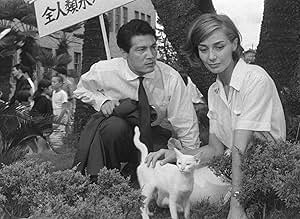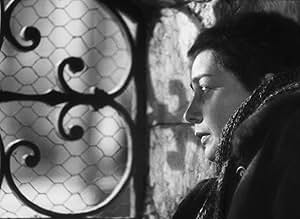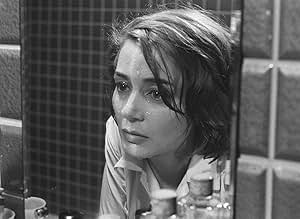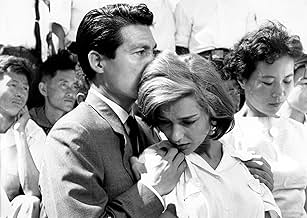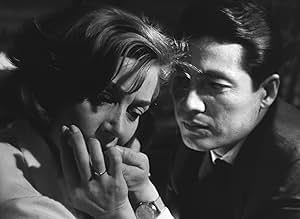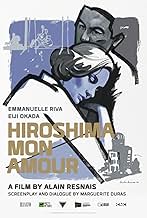Hiroshima mon amour
- 1959
- Tous publics
- 1h 30min
NOTE IMDb
7,8/10
38 k
MA NOTE
Une actrice française qui tourne un film contre la guerre à Hiroshima a une aventure avec un architecte japonais marié au cours de laquelle ils échangent leurs points de vue différents sur l... Tout lireUne actrice française qui tourne un film contre la guerre à Hiroshima a une aventure avec un architecte japonais marié au cours de laquelle ils échangent leurs points de vue différents sur la guerre.Une actrice française qui tourne un film contre la guerre à Hiroshima a une aventure avec un architecte japonais marié au cours de laquelle ils échangent leurs points de vue différents sur la guerre.
- Réalisation
- Scénario
- Casting principal
- Nommé pour 1 Oscar
- 7 victoires et 7 nominations au total
Avis à la une
10RunPepe
This film has been compared to "Citizen Kane," not because of the story itself, but the way it is told, and through innovative artistic devices. The screenplay is highly poetic even when describing destruction, death, and madness. Several jump cuts in time occur with voice-over, and, at the beginning, voice-over during a montage of frightening images from the aftermath of the Hiroshima bombing and the bodies of the two lovers in bed. The characters represent different cities; the Japanese man, Hiroshima, the French woman, a city in France, Nevers (was this intentional?), but the latter might as well represent any outside nation. While "Hiroshima," even after being destroyed by an "ally" of France, falls in love with her and wants her to stay, despite his claims that she can never know what the bombing was really like, yet leaving this in the past without forgetting, "France" is hung up on a dead Nazi soldier whom she had loved, and became an outcast because of it. What the soldier really seems to represent is not the Nazis, but rather a real, true love that transcended nationalities and associations. France's past is personal and fears forgetting it, while Hiroshima's is communal and, while not wanting to forget, also wants to move ahead. For this reason Hiroshima keeps trying to convince France to stay so that they can be in love, but France is too preoccupied with its own personal ghost that it cannot share, which is why it is a major breakthrough for her when she tells her tragic story for the first time to anyone, Hiroshima. Hiroshima's past tragedy being communal is shared and it wants to share with the rest of the world. France's tragedy is personal and is only beginning to be shared. It takes the entire film before the two characters can get to a beginning of something more than their differences and likenesses of tragedy and loss in the past, and this beginning is who they really are, in the present, two people reborn from these tragedies.
I saw this thirty or so years ago. I don't remember it moving me profoundly, but then so many things at that age routinely inject you with massive change without you knowing. Seeing it now gives me great, great appreciation for what it is. And though I have been previously exposed, it washed over me all over again.
It has a laconic pace. Usually, one leverages this for relaxation into nature. Robert Redord. Here it relaxes into a tension of a different order, a quiet insistent striving for connection, like "In the Mood for Love." In this case though, the filmmaker has turned that yearning sideways so you have three dimensions of pull.
You have the desire for romance, here presented in a way that is more engaging than usual because of its folding into the other dimensions. You have the desire to comprehend war, war defined here as the sacrifice of innocents and war as a sort of incomprehensible desire running in parallel to all the other incomprehensible desires we see, every one.
And you have the desire of a film to reach into the inner world of ourselves. Film itself is a character here, with its own desires and doubts. The three of these fold in such a way that as we spend time with them we have to fill it by pouring ourselves into the film because it pulls story from us rather than serving it in timely patter.
Its an open world, made open by providing an amazing skeleton, on which we are surprised to find our own flesh and our own wondering about next actions.
He, an architect, she an actress, both highly cinematic beings. Both in Hiroshima with folded cranes over dying souls in beds. Both, this is us now, wondering, shall we do it? Shall she stay? What will it mean? Surely that the world will not be saved, not even a little, not even that they may try. Or will they? Should they?
This is such an open framework that not only do you pour yourself into it, but other filmmakers can and do. You owe it to yourself to see "H Story." after this. Or better, before. Hah!
Ted's Evaluation -- 4 of 3: Every cineliterate person should experience this.
It has a laconic pace. Usually, one leverages this for relaxation into nature. Robert Redord. Here it relaxes into a tension of a different order, a quiet insistent striving for connection, like "In the Mood for Love." In this case though, the filmmaker has turned that yearning sideways so you have three dimensions of pull.
You have the desire for romance, here presented in a way that is more engaging than usual because of its folding into the other dimensions. You have the desire to comprehend war, war defined here as the sacrifice of innocents and war as a sort of incomprehensible desire running in parallel to all the other incomprehensible desires we see, every one.
And you have the desire of a film to reach into the inner world of ourselves. Film itself is a character here, with its own desires and doubts. The three of these fold in such a way that as we spend time with them we have to fill it by pouring ourselves into the film because it pulls story from us rather than serving it in timely patter.
Its an open world, made open by providing an amazing skeleton, on which we are surprised to find our own flesh and our own wondering about next actions.
He, an architect, she an actress, both highly cinematic beings. Both in Hiroshima with folded cranes over dying souls in beds. Both, this is us now, wondering, shall we do it? Shall she stay? What will it mean? Surely that the world will not be saved, not even a little, not even that they may try. Or will they? Should they?
This is such an open framework that not only do you pour yourself into it, but other filmmakers can and do. You owe it to yourself to see "H Story." after this. Or better, before. Hah!
Ted's Evaluation -- 4 of 3: Every cineliterate person should experience this.
This is surely one of the most impressive movies i know. It is also a very impressive portrait of a woman. Don't expect to see an ordinary love story -it is as not so much a love story as a story of a wounded person meeting a wounded city. A story about two people hurt by peace. Even though it is over more than four decennia old it feels surprisingly new. The reason for this must be the beautiful photography -starting with the very first shots of the two lovers- and the deliberate moving away from conventional script writing by Marguerite Dumas. The movie has the feel of an opera, with the music of Georges Delerue as a moving force. I thought it was enchanting, and it stayed with me for days after.
Hiroshima Mon Amour is brilliantly made and brilliantly acted, with a thoughtful, poetic script by the great French writer, Marguerite Duras. Its images are lyrical, disturbing, fascinating, and its anti-war message is profound and still frighteningly relevant. But in terms of strict entertainment...
Any film which begins with abstracted images of the entwined body parts of human lovers, slowly becoming encrusted with ash and (presumably) atomic fallout... and then spends an obscure 15 minutes arguing about the death and disfigurement of multitudes during the atomic bomb blast in Hiroshima, and the nature of memory and forgetfulness... well, you realize immediately that this movie isn't set up to go anyplace fun. Unless your idea of "fun" is witnessing someone else's graphic misery without the cleansing catharsis that accompanies a more conventional tragedy. Hey, some people enjoy that kind of thing! Not me, but to each his/her own.
Despite a structure which is famous for meandering through time, the film's narrative is fairly cogent and non-confusing, which is a plus. But the central illicit, inter-racial affair between a French actress and the Japanese architect whom she hooks up with during a film shoot in Hiroshima... It doesn't really make any sense. From the tiny acorn of a chance hookup, grows a mad-passionate love affair based almost entirely on memories dredged from the actress' past, which she disgorges to the architect, rather like a colorless Scheherezade, as she loses all rational connection to the present, conflating a youthful indiscretion with a deceased German soldier (and her subsequent descent into madness) with the non-happenings surrounding her current Japanese amour. German, Japanese... clearly, she can't tell these Axis races apart! I understand that the point of the film was not to create strict narrative coherence, but rather to delve into some kind of symbolic and psychic clash between this cold-yet-overwrought union of a French woman and her obsessed Japanese lover, and the horrors of War. But, despite some moments which are outright absurdist in effect, the overall tone of the film is grinding in its humorlessness. As I watched the characters fatalistically surrendering to their doom, all I could think was, "man, that Marguerite Duras must have been a drag to be romantically involved with." I mean, the Duras script, for all it's poetic symbolism and intellectual brilliance, etc etc, tells a story of people who are criminally passive and hopelessly clingy. Love seems to transform her characters into mere victims, of love, of war, of life, masochistically reveling in their own operatic suffering while doing virtually nothing. As the nameless SHE recalls her own suffering during her madness, scraping her fingertips off on the saltpeter-encrusted walls of her parent's cellar-prison, then receiving validation of existence by luxuriously sucking her own blood from her ravaged hands because otherwise she is utterly alone, all I could think was... Oh brother! This character is so badly damaged, how did she ever manage to get happily married before she embarked on this chance affair in Japan? The imagery is fabulous and intense, but are these really human beings that could have plausibly embarked on a journey together? One human being, actually, because the Japanese architect is little more than a handsome cipher of "love"... love, in this story, apparently meaning the obsession that arises from the act of physical copulation, an experience which is equated with destruction of the nuclear holocaust variety. So, Marguerite Duras clearly had issues surrounding her expression and experience of sexuality. And the film betrays little in the way of empathy, either, the characters are infused with an undercurrent of intense selfishness as they struggle to connect. HE is constantly delving into HER unhappy past even though it can give neither of them any pleasure or joy. The more HE delves, the more SHE becomes hopelessly entangled, and the more obsessed HE becomes... until the cold and bitter end.
At least in an opera, you get to revel in an outpouring of passion! In this bitter pill, everything is so cold and humorless... well, it really is difficult to understand why people wax enthusiastic over this film so much. There is much here to ADMIRE... but not much to love, in my opinion. Except intellectually, because the film is awash with symbolism and thought-provoking moments. As a viewing experience for the average intellectual, such as myself, however, I felt that once was enough. The time jumping and abstractions and other critically lauded elements of this movie have been done better and more entertainingly by others. Though this is the most emotionally powerful anti-nuclear statement I've ever seen, for which, as someone who had much of his family die in the Hiroshima nuclear blast, I am profoundly grateful.
Any film which begins with abstracted images of the entwined body parts of human lovers, slowly becoming encrusted with ash and (presumably) atomic fallout... and then spends an obscure 15 minutes arguing about the death and disfigurement of multitudes during the atomic bomb blast in Hiroshima, and the nature of memory and forgetfulness... well, you realize immediately that this movie isn't set up to go anyplace fun. Unless your idea of "fun" is witnessing someone else's graphic misery without the cleansing catharsis that accompanies a more conventional tragedy. Hey, some people enjoy that kind of thing! Not me, but to each his/her own.
Despite a structure which is famous for meandering through time, the film's narrative is fairly cogent and non-confusing, which is a plus. But the central illicit, inter-racial affair between a French actress and the Japanese architect whom she hooks up with during a film shoot in Hiroshima... It doesn't really make any sense. From the tiny acorn of a chance hookup, grows a mad-passionate love affair based almost entirely on memories dredged from the actress' past, which she disgorges to the architect, rather like a colorless Scheherezade, as she loses all rational connection to the present, conflating a youthful indiscretion with a deceased German soldier (and her subsequent descent into madness) with the non-happenings surrounding her current Japanese amour. German, Japanese... clearly, she can't tell these Axis races apart! I understand that the point of the film was not to create strict narrative coherence, but rather to delve into some kind of symbolic and psychic clash between this cold-yet-overwrought union of a French woman and her obsessed Japanese lover, and the horrors of War. But, despite some moments which are outright absurdist in effect, the overall tone of the film is grinding in its humorlessness. As I watched the characters fatalistically surrendering to their doom, all I could think was, "man, that Marguerite Duras must have been a drag to be romantically involved with." I mean, the Duras script, for all it's poetic symbolism and intellectual brilliance, etc etc, tells a story of people who are criminally passive and hopelessly clingy. Love seems to transform her characters into mere victims, of love, of war, of life, masochistically reveling in their own operatic suffering while doing virtually nothing. As the nameless SHE recalls her own suffering during her madness, scraping her fingertips off on the saltpeter-encrusted walls of her parent's cellar-prison, then receiving validation of existence by luxuriously sucking her own blood from her ravaged hands because otherwise she is utterly alone, all I could think was... Oh brother! This character is so badly damaged, how did she ever manage to get happily married before she embarked on this chance affair in Japan? The imagery is fabulous and intense, but are these really human beings that could have plausibly embarked on a journey together? One human being, actually, because the Japanese architect is little more than a handsome cipher of "love"... love, in this story, apparently meaning the obsession that arises from the act of physical copulation, an experience which is equated with destruction of the nuclear holocaust variety. So, Marguerite Duras clearly had issues surrounding her expression and experience of sexuality. And the film betrays little in the way of empathy, either, the characters are infused with an undercurrent of intense selfishness as they struggle to connect. HE is constantly delving into HER unhappy past even though it can give neither of them any pleasure or joy. The more HE delves, the more SHE becomes hopelessly entangled, and the more obsessed HE becomes... until the cold and bitter end.
At least in an opera, you get to revel in an outpouring of passion! In this bitter pill, everything is so cold and humorless... well, it really is difficult to understand why people wax enthusiastic over this film so much. There is much here to ADMIRE... but not much to love, in my opinion. Except intellectually, because the film is awash with symbolism and thought-provoking moments. As a viewing experience for the average intellectual, such as myself, however, I felt that once was enough. The time jumping and abstractions and other critically lauded elements of this movie have been done better and more entertainingly by others. Though this is the most emotionally powerful anti-nuclear statement I've ever seen, for which, as someone who had much of his family die in the Hiroshima nuclear blast, I am profoundly grateful.
10Hitchcoc
As a college freshman some 45 years ago, I saw this film in the student union They had a commitment to art films. I have to say that I do remember the stream of dialog between the two characters but little about the content. I knew he (the Japanese man) had lost his family on that August day. I recall her pulling inward as he becomes a bit demanding. Watching it with mature eyes and a fresh view of the world, I was brought back to these two traumatized characters and the war that changed them forever. It begins with a discussion of the Hiroshima museum which contains pictures and artifacts from that fateful day. He keeps telling her that she has not seen Hiroshima as they lay entwined in bed. His pain is more predictable. He lost his family that day while he was away. Hers takes a more melancholy road. As she opens up, she tells the story of a love affair with a German soldier whom she would meet in all manner of places. One day she found him dying, curled up on the ground. She sits with him until he dies. New of their trysts gets out and she is ostracized by her community, her hair cropped, beaten, and thrown in a cellar by her own family. She has not told this story to anyone, including her own husband, until now. While she feels somewhat liberated the pain is too deep. The Japanese man, also married, wants her to stay in Hiroshima. The movie is about the relationship going forward with such damaged people. She repeatedly tries to escape him, but he keeps resurfacing. The sad thing is that she desires him and so it's not as if she is being stalked. Resnais is a master with the camera, using black and white contrasting images, engaging flashbacks, close-ups. One really marvelous scene is where the young woman, who has been playing a small part in an anti-war film, is nearly trampled by protesters carrying signs. Hiroshima is constantly in her face. She has been hurt so badly by the war and is carrying a load of guilt. War carries with it a loss of innocence and pain beyond the obvious. This film really captures this.
Le saviez-vous
- AnecdotesThis film pioneered the use of jump cutting to and from a flashback, and of very brief flashbacks to suggest obtrusive memories.
- GaffesWhen Elle leaves the hotel to go the set, she is wearing a nurse's uniform with a headscarf and carrying a black handbag. When Lui meets her on the set, she is now wearing a skirt and blouse and still has the headscarf. When they leave the set, the headscarf is left behind. When they get to Lui's house, she now has a white jacket.
- ConnexionsEdited into Histoire(s) du cinéma: Le contrôle de l'univers (1999)
Meilleurs choix
Connectez-vous pour évaluer et suivre la liste de favoris afin de recevoir des recommandations personnalisées
- How long is Hiroshima Mon Amour?Alimenté par Alexa
Détails
- Date de sortie
- Pays d’origine
- Langues
- Aussi connu sous le nom de
- Hiroshima Mon Amour
- Lieux de tournage
- Nevers, Nièvre, France(street scenes, river banks)
- Sociétés de production
- Voir plus de crédits d'entreprise sur IMDbPro
Box-office
- Montant brut aux États-Unis et au Canada
- 96 439 $US
- Week-end de sortie aux États-Unis et au Canada
- 18 494 $US
- 19 oct. 2014
- Montant brut mondial
- 139 947 $US
- Durée1 heure 30 minutes
- Couleur
- Mixage
- Rapport de forme
- 1.37 : 1
Contribuer à cette page
Suggérer une modification ou ajouter du contenu manquant

Lacune principale
By what name was Hiroshima mon amour (1959) officially released in India in English?
Répondre


